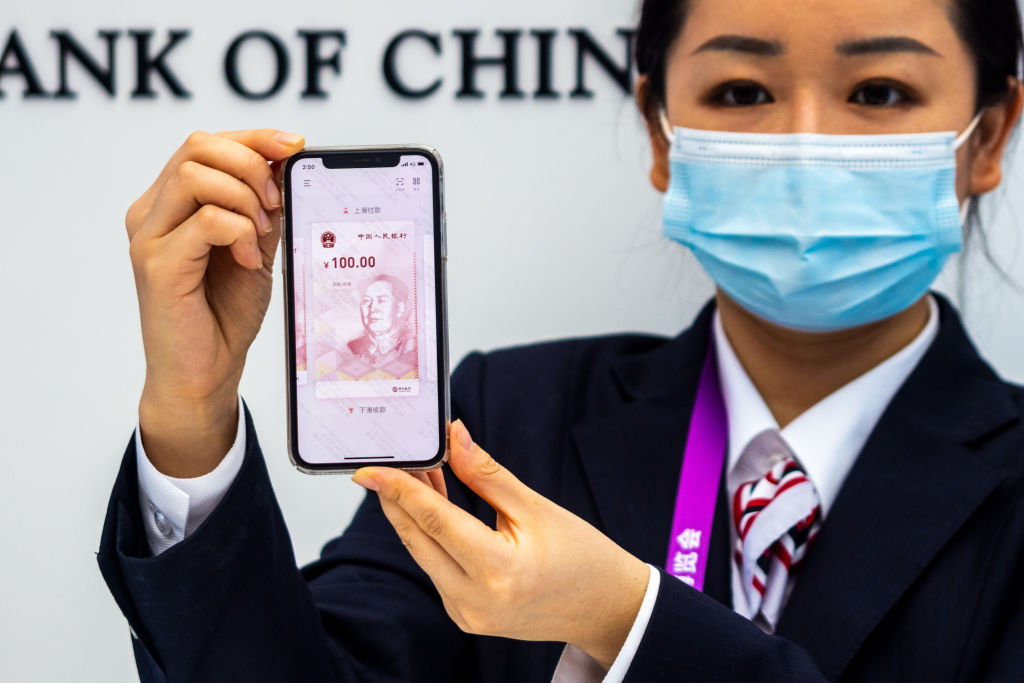Biden’s handpicked banker declares war on digital freedom.
Cashless Future

The rise of centralized digital currency will be convenient—but at a cost.
Fewer Americans are using cash. In 2019, almost a third of Americans said they never used cash to make purchases. More recently, only 16 percent of U.S. consumers said they carried cash, with 58 percent of respondents saying they planned to stop using cash completely. Cash, it appears, is no longer king.
The death of cash comes at the same time as the death of banks. Last year, U.S. banks closed a record number of branches—nearly 4,000 in total. Since 2012, the rate of branch closures has been doubling every three years; at this rate, all U.S. bank branches could be closed by 2034. Rejoice, some may say—banks have too much power, anyway.
In truth, though, banks themselves aren’t going anywhere. More and more banks are closing their physical doors, but that’s because we’re moving into a more digitalized world. The centralized power enjoyed and exercised by banks isn’t going away; in fact, their power will likely increase. Yes, cash will almost certainly disappear, but the influence of banks won’t. We are hurtling towards a cashless society, almost entirely digital in nature. Who stands to benefit from this transition?
The Society for Worldwide Interbank Financial Telecommunication—known as SWIFT—is a payment system that’s governed by the G-10 central banks (Belgium, Canada, France, Germany, Italy, Japan, The Netherlands, United Kingdom, United States, Switzerland, and Sweden), the European Central Bank (ECB), and the National Bank of Belgium. An influential network, SWIFT has 11,000 member banks in 200 different countries and territories. SWIFT made headlines earlier this year when it sanctioned a number of Russian banks, effectively isolating them from the international financial system.
Around the very same time that it hit the Kremlin with sanctions, SWIFT announced that it was collaborating with Capgemini, a global leader in digital technologies, to work on central bank digital currencies. Commonly referred to as CBDCs, these government-backed digital currencies are being positioned as the future of finance. Ninety percent of the world’s central banks are currently working on CBDCs. In the U.S., members of Congress are pressuring the Federal Reserve to create a digital dollar, a fully functional CBDC. A digital currency replacing the greenback would overturn the entire way we conceptualize and use money. Cash would truly disappear.
Though adopting a digital dollar could have some benefits (convenience, for example), a cashless society brings a whole host of new, potentially devastating dangers. A cashless society, by default, becomes a more surveilled society. Moreover, as the financial guru Nir Netzer speculated, it is “possible that gentrification through cash exclusion ultimately drives out the bottom of the pyramid.” The sociopolitical implications of a digital monetary system are staggering, because mapping a Chinese-style social credit score onto the structure of individual digital bank accounts would be not only easy—it would be the obvious next step. CBDCs make both authoritarianism and censorship easier and more likely.
The World Economic Forum (WEF), the international organization that promotes SWIFT and the Great Reset, recently published its Future Focus 2025 report. The authors call for the mass roll out of CBDCs—but only if these digital currencies are accompanied by digital IDs. According to the authors of the dystopian report: “While CBDCs promise to revolutionize payments and deliver efficiencies for consumers (retail or commercial), it is still unclear how their architecture accommodates an identity layer.” Thus a “digital identity layer should be developed” to accompany CBDCs. These government-backed digital currencies will be fully traceable and permissions-based. In other words, those in charge will be able to dictate what you can and cannot buy.
Digital IDs lay the foundation for social credit systems. For those who scoff at the idea of a social credit system, let me remind you that the United States, supposedly the land of the free, already has a soft social credit system in place, with millions of American workers being tracked, recorded, and even ranked.
Say what you like about Bitcoin, at least it was designed to give power to the people. A decentralized technology, it is the antithesis of CBDCs, which is the reason why the WEF isn’t a fan. Some analysts argue that centralized digital currencies and pure cryptocurrencies like Ethereum and Bitcoin can co-exist. But for centralized currencies to be fully effective, cryptocurrencies must be demoted or even eliminated from the financial equation.
Two decades ago, the behavioral economist Richard Thaler and legal scholar Cass Sunstein coined the term ‘libertarian paternalism,” the naïve idea that it’s possible for private and public establishments to change our behavior while also respecting our human rights. The push for CBDCs (and the digital IDs that will accompany them) is more like “statist paternalism,” a political system in which the state has complete, centralized control over its citizens’ actions and affairs. The elimination of cash is really an elimination of something much more profound: individual choice and freedom. Digital currencies may very well be more convenient, but that convenience will come at a significant cost.
The American Mind presents a range of perspectives. Views are writers’ own and do not necessarily represent those of The Claremont Institute.
The American Mind is a publication of the Claremont Institute, a non-profit 501(c)(3) organization, dedicated to restoring the principles of the American Founding to their rightful, preeminent authority in our national life. Interested in supporting our work? Gifts to the Claremont Institute are tax-deductible.
The truckers’ occupation of Ottawa has revealed the fecklessness of the Regime.
Inept regulation threatens to suffocate the greatest innovation finance has seen in centuries.



